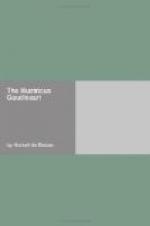To talk, to make people listen to you,—that is seduction in itself. A nation that has two Chambers, a woman who lends both ears, are soon lost. Eve and her serpent are the everlasting myth of an hourly fact which began, and may end, with the world itself.
“A conversation of two hours ought to capture your man,” said a retired lawyer.
Let us walk round the commercial traveller, and look at him well. Don’t forget his overcoat, olive green, nor his cloak with its morocco collar, nor the striped blue cotton shirt. In this queer figure—so original that we cannot rub it out—how many divers personalities we come across! In the first place, what an acrobat, what a circus, what a battery, all in one, is the man himself, his vocation, and his tongue! Intrepid mariner, he plunges in, armed with a few phrases, to catch five or six thousand francs in the frozen seas, in the domain of the red Indians who inhabit the interior of France. The provincial fish will not rise to harpoons and torches; it can only be taken with seines and nets and gentlest persuasions. The traveller’s business is to extract the gold in country caches by a purely intellectual operation, and to extract it pleasantly and without pain. Can you think without a shudder of the flood of phrases which, day by day, renewed each dawn, leaps in cascades the length and breadth of sunny France?
You know the species; let us now take a look at the individual.
There lives in Paris an incomparable commercial traveller, the paragon of his race, a man who possesses in the highest degree all the qualifications necessary to the nature of his success. His speech is vitriol and likewise glue,—glue to catch and entangle his victim and make him sticky and easy to grip; vitriol to dissolve hard heads, close fists, and closer calculations. His line was once the hat; but his talents and the art with which he snared the wariest provincial had brought him such commercial celebrity that all vendors of the “article Paris"[*] paid court to him, and humbly begged that he would deign to take their commissions.
[*] “Article Paris” means anything—especially
articles of wearing
apparel—which originates
or is made in Paris. The name is
supposed to give to the thing
a special value in the provinces.
Thus, when he returned to Paris in the intervals of his triumphant progress through France, he lived a life of perpetual festivity in the shape of weddings and suppers. When he was in the provinces, the correspondents in the smaller towns made much of him; in Paris, the great houses feted and caressed him. Welcomed, flattered, and fed wherever he went, it came to pass that to breakfast or to dine alone was a novelty, an event. He lived the life of a sovereign, or, better still, of a journalist; in fact, he was the perambulating “feuilleton” of Parisian commerce.




